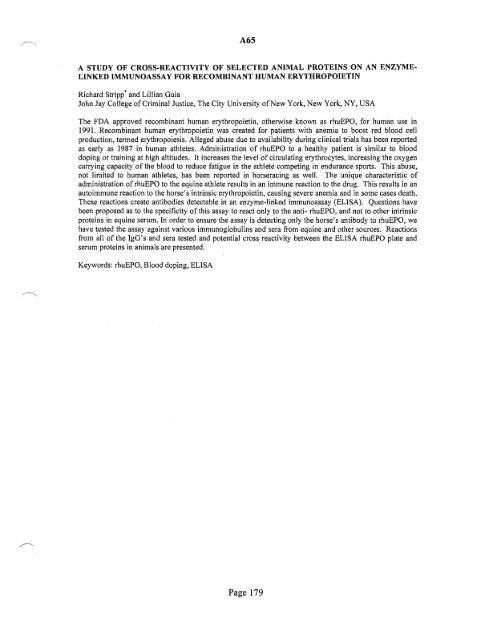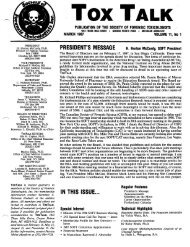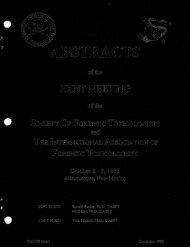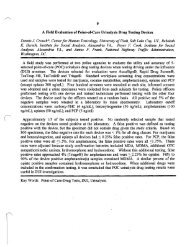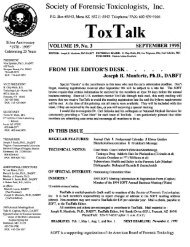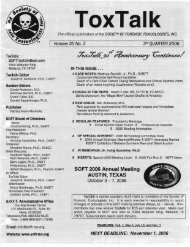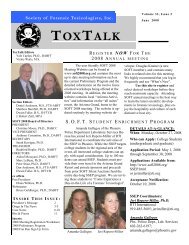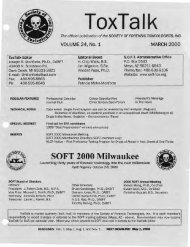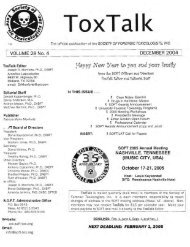- Page 1 and 2:
KeY'Nord Index Abdomen pain, C II
- Page 3 and 4:
Environmental toxicology, C4 Enzyme
- Page 5 and 6:
Non-controlled psychotropic substan
- Page 7 and 8:
Presenting Author Index . · A'
- Page 9 and 10:
Parker Dawn R PS6 Paterson Sue F9 I
- Page 11 and 12:
At DETERMINATION OF PHENETHYLAMINE
- Page 13 and 14:
A3 COMPARISON OF THE SENSITIVITY A
- Page 15 and 16:
AS SURVEY ON FORENSIC TOXICOLOGICA
- Page 17 and 18:
A7 QUANTITATIVE DETERMINATION OF A
- Page 19 and 20:
A9 . RESOURCE GUIDE FOR USERS OF S
- Page 21 and 22:
All DIRECT ANALYSIS OF MDMA AND MET
- Page 23 and 24: A13 SCREENING FOR ACE INHIBITORS A
- Page 25 and 26: A15 ANALYSIS FOR LORAZEPAM IN BLOO
- Page 27 and 28: A17 HIGH.PERFORMANCE LIQUID CHROMA
- Page 29 and 30: A19 PERFORMANCE OF ASSAYS FOR THER
- Page 31 and 32: A21 ALCOHOL DETERMINATION BY HEAD
- Page 33 and 34: A23 THE EXTRACTION AND ANALYSIS OF
- Page 35 and 36: A25 A RAPID METHOD FOR MEASURING AN
- Page 37 and 38: A27 EFFECT OF SODIUM CHLORIDE ON H
- Page 39 and 40: A29 SIMULTANEOUS DETERMINATION OF
- Page 41 and 42: A31 ANALYSIS OF TETRAHYDROCANNABIN
- Page 43 and 44: A33 EVALUATION OF BUPRENORPHINE CE
- Page 45 and 46: A35 ETHYLGLUCRONIDE ANALYSIS IN UR
- Page 47 and 48: ..~. A37 HIGH THROUGHPUT SCREENING
- Page 49 and 50: A39 RAPID DETERMINA nON OF CHLORAM
- Page 51 and 52: A41 DETERMINATION OF STRYCHNINE IN
- Page 53 and 54: A43 SIMULTANEOUS DETERMINATION OF
- Page 55 and 56: A45 FAST QUANTIFICATION OF ETHANOL
- Page 57 and 58: A47 STABILITY OF PLASMA ACETALDEHY
- Page 59 and 60: A49 AN LC-MSIMS METHOD FOR THE QUA
- Page 61 and 62: AS1 SIMULTANEOUS ANALYSIS OF HIPPU
- Page 63 and 64: AS3 DETERMINATION OF ETHYL GLUCURO
- Page 65 and 66: ASS EFFECTS OF ASCORBATE DERJV A T
- Page 67 and 68: A57 ELISA FOR THE SCREENING OF OPI
- Page 69 and 70: A59 DETERMINATION OF ACONITINE ALK
- Page 71 and 72: A61 SIMULTANEOUS ANALYSIS FOR PSYC
- Page 73: A63 SOLID-PHASE MICROEXTRACTION BAS
- Page 77 and 78: A67 A GENERAL SCREENING AND CONFIR
- Page 79 and 80: A69 FORENSIC DRUG ANALYSIS WITHOUT
- Page 81 and 82: A71 USE OF STANDARD ADDITION/STAND
- Page 83 and 84: A73 PREVALENCE OF GHB IN SUSPECTED
- Page 85 and 86: A7S IDENTIFICATION AND ISOLATION O
- Page 87 and 88: A77 DETERMINING THE USE OF N1-ETHY
- Page 89 and 90: A79 LC-MSIMS METHOD DEVELOPMENT FO
- Page 91 and 92: A81 PHENMETRAZINE OR EPHEDRINE FOO
- Page 93 and 94: A83 DETERMINA TION OF NALOXONE AND
- Page 95 and 96: Scientific Session Abstracts: Beh
- Page 97 and 98: B2 PROSPECTIVE STUDY ABOUT THE EFF
- Page 99 and 100: B4 REASONS FOR OVERESTIMATION OF T
- Page 101 and 102: B6 EVALUATION OF THE POST-ROTATION
- Page 103 and 104: B8 TOXICOLOGICAL FINDINGS IN CASES
- Page 105 and 106: BIO LOW BLOOD ALCOHOL LEVELS, ATTEN
- Page 107 and 108: B12 DRUGS OF ABUSE IN PORTUGAL; A
- Page 109 and 110: B14 EFFECTS OF OPIOIDS ON METHAMPH
- Page 111 and 112: B16 AMELIORATION OF LEAD TOXICITY
- Page 113 and 114: ·Scientific Session Abstracts: C
- Page 115 and 116: C2 PARADOXICAL RESULTS FROM SCREEN
- Page 117 and 118: C3 ALUMINUM TESTING IN TRACE-METAL
- Page 119 and 120: C5 DETECTION OF NITRAZEPAM USING I
- Page 121 and 122: C7 METHCATHINONE: A NEW POSTINDUST
- Page 123 and 124: C9 A PROPOSED SCHEME FOR FOXY META
- Page 125 and 126:
ell ABDOMINAL COMPLICATION OF INHAL
- Page 127 and 128:
C13 A HOMOGENEOUS ENZYME IMMUNOASS
- Page 129 and 130:
CIS RAPID DETERMINATION OF CAUSATI
- Page 131 and 132:
C17 CHANGES OF GENE EXPRESSION BEF
- Page 133 and 134:
C19 A CASE OF SURREPTITIOUS NON-FA
- Page 135 and 136:
e21 RAPID, SIMPLE AND V ALIDA TED G
- Page 137 and 138:
C23 BIOMONITORING OF EXPOSURE TO C
- Page 139 and 140:
C25 PROPYLENE GLYCOL IN EXTREMELY
- Page 141 and 142:
C27 PHARMACEUTICAL IDENTIFICATION
- Page 143 and 144:
C29 AN EVENT ASSOCIATED WITH FATAL
- Page 145 and 146:
C31 DETECTION OF NEW MINOR METABOL
- Page 147 and 148:
C33 NOVEL ASPECTS OF IN VITRO META
- Page 149 and 150:
Scientific Session Abstracts: . F
- Page 151 and 152:
F2 URINE ADUL TERA TION TRENDS FROM
- Page 153 and 154:
F5 PAPAIN, A NOVEL URINE ADULTERAN
- Page 155 and 156:
F6 A COMPARATIVE EVALUATION OF THE
- Page 157 and 158:
F8 UNUSUAL DRUG TEST RESULTS FROM
- Page 159 and 160:
FlO EFFECTIVENESS OF FREE AND TOTAL
- Page 161 and 162:
F12 TITLE: AMPHETAMINE CONCENTRATI
- Page 163 and 164:
F14 AUTOMATED APPROACH TO NON-NEGA
- Page 165 and 166:
F16 URINARY EXCRETION OF MORPHINE
- Page 167 and 168:
FI8 A RAPID LCIMS METHOD FOR THE D
- Page 169 and 170:
F20 CONFIRMATION RATES OF INITIAL
- Page 171 and 172:
F22 USE OF COMPOUNDS ALTERING VIGI
- Page 173 and 174:
F23 SCREENING OF BUPRENORPHINE IN
- Page 175 and 176:
F25 IDENTIFICATION OF CHLORINATED
- Page 177 and 178:
F27 LINEAR RELATIONSHIPS OF 6.-9-T
- Page 179 and 180:
Ml COMPARISON STUDY OF SPE AND HS-S
- Page 181 and 182:
M3 AMPHETAMINE BINDING TO SYNTHETI
- Page 183 and 184:
M5 METHOD VALIDATION AND DETERMINA
- Page 185 and 186:
M7 EVALUATION OF KETAMINE ABUSE US
- Page 187 and 188:
M9 SCREENING OF BENZODIAZEPINES AN
- Page 189 and 190:
Mll DIAGNOSIS OF CHRONIC ALCOHOL CO
- Page 191 and 192:
M13 EVIDENCE OF ADDICTION BY ANAES
- Page 193 and 194:
M15 DRUG DETECTION IN ORAL FLUID:
- Page 195 and 196:
M17 CANNABINOID ANALYSIS OF ORAL F
- Page 197 and 198:
M19 METHOD DEVELOPMENT OF MICROWAV
- Page 199 and 200:
M21 IMPROVED GCMS ANALYSIS OF THC
- Page 201 and 202:
M23 ~9-TETRAHYDROCANNABINOL (THC),
- Page 203 and 204:
M25 ,--- LIQUID CHROMATOGRAPHY -
- Page 205 and 206:
M27 DETERMINA TION OF THC IN ORAL
- Page 207 and 208:
M29 CODEINE AND METABOLITE DISPOSI
- Page 209 and 210:
M31 DETERMINATION OF A'.TETRAHYDRO
- Page 211 and 212:
M33 ENHANCED SENSITIVITY FOR DRUGS
- Page 213 and 214:
M35 DRUG DETECTION IN HAIR: ASSESS
- Page 215 and 216:
M37 ALCOHOL TESTING BY AN ONSITE O
- Page 217 and 218:
M39 QUANTITATIVE ANALYSIS OF DEXTR
- Page 219 and 220:
M41 GAS CHROMATOGRAPHY:'HIGH-RESOLU
- Page 221 and 222:
M43 COCAETHYLENE: A POTENTIALLY LE
- Page 223 and 224:
M45 DETECTION OF COTININE IN EXHAL
- Page 225 and 226:
M47 METHAMPHETAMINE AND AMPHETAMIN
- Page 227 and 228:
M49 DISPOSITION OF NJ-TETRAHYDROCAN
- Page 229 and 230:
MSl DISPOSITION OF COCAINE AND META
- Page 231 and 232:
PI NEW GENERATIONS OF ANTIDEPRESAN
- Page 233 and 234:
P3 POSTMORTEM REDISTRIBUTION OF TH
- Page 235 and 236:
PS POSTMORTEM DETERMINATION OF SIL
- Page 237 and 238:
P7 A COMBINED DRUG INTOXICATION IN
- Page 239 and 240:
P9 DETERMINATION OF OXCARBAZEPINE
- Page 241 and 242:
PH DISTRIBUTION OF QUETIAPINE IN N
- Page 243 and 244:
P13 MIRTAZAPINE-RELATED DEATHS R A
- Page 245 and 246:
PIS LEVELS OF LEVETIRACETAM IN POS
- Page 247 and 248:
P17 POSTMORTEM DISTRIBUTION OF TRA
- Page 249 and 250:
P19 EVALUA TION OF DEBATED QUESTIO
- Page 251 and 252:
P21 "STUDENT ON ALPHA-METHYLTRYPTA
- Page 253 and 254:
P23 CASE REPORT: THE USE OF AMITRI
- Page 255 and 256:
P25 ECSTACY MANUFACTURE: A CASE FO
- Page 257 and 258:
P27 ANALYSIS OF POSTMORTEM BONEIBO
- Page 259 and 260:
P29 THE ROLE OF COCAINE IN HEROIN
- Page 261 and 262:
P31 TRENDS IN THE DETECTION OF DRU
- Page 263 and 264:
P33 POSTMORTEM CASES RELATED TO COC
- Page 265 and 266:
P35 CARBON MONOXIDE AND ETHANOL IN
- Page 267 and 268:
P37 QUANTITA TIVE APPROACH TO DRUG
- Page 269 and 270:
P39 FORMALIN-INDUCED METHAMPHETAMI
- Page 271 and 272:
P41 SURVEY OF ABUSED DRUGS IN PERI
- Page 273 and 274:
P43 "ECSTASY" IN THE A.M. AND P.M.
- Page 275 and 276:
P45 ARSENIC IN NAPOLEON'S HAIR: IS
- Page 277 and 278:
P47 INTERPRETATION OF POSTMORTEM A
- Page 279 and 280:
P49 ALFENTANIL FATAL INJECTION: A
- Page 281 and 282:
PSt UNUSUAL TRAMADOL CONCENTRATIONS
- Page 283 and 284:
P53 LORAZEPAM AND DEATH INVESTIGAT
- Page 285 and 286:
P55 QUETIAPINE CONCENTRATIONS IN I
- Page 287 and 288:
PS7 CAFFEINE INTOXICA nON: MORE TH
- Page 289 and 290:
P59 INTERPRETING ANTIHISTAMINE LEV
- Page 291 and 292:
P61 A MULTI-CENTER STUDY OF PHARMA
- Page 293 and 294:
P63 GHB CONCENTRATIONS IN A V ARlE
- Page 295:
P65 POSTMORTEM BLOOD ALCOHOL RELIAB


